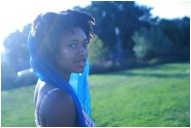When I think of my father
sometimes I think of hot links-
the halal ones he’d serve for breakfast
then sell at the masjid on sunday.
You see, my daddy had many hustles
and one of them was hot links-
fry em’ in a skillet in the morning
then marry em’ to the buttermilk pancakes
and grace them with smooth grits.
They were sunday-morning muslim bliss
best when thawed, and never too spicy-
packed tight into the freezer
and still packed tight into my memory.
–Nijla Mu’min (2010)
When I was a little girl, I’d sit in the front seat of my father’s car and ask him if the R&B singer Anita Baker was a Muslim. I’d ask him if Michael and Janet Jackson were as well. He’d nod and say, “InshAllah Nijla.” I was content in knowing that one day they might become a part of our community; a community that helped give me a sense of purpose. We rode on. My father whistled to the Miles Davis on the radio and I couldn’t wait to eat another halal hot link with buttermilk pancakes for breakfast the next morning.
I’m 26 years old now and I’m always rushing. I rush to get to school. I rush to make deadlines. I run out of the house in the morning without eating or thinking, trying not to be late to the class I help teach. I neglect to eat so I can get “work done,” remembering in the evening as my stomach cries.
I pass by an Islamic center in my LA neighborhood and tell myself that I’ll go there next week, but it doesn’t happen. Between fundraising for my thesis film, trying to complete a dual MFA degree, and worrying about a slew of personal matters that are outside of my reach, things get lost in transit. I get lost. I forget that the mind and body are but so strong in cases of extreme stress and anxiety. They need sustenance.
Recently, I was in a traffic jam on the freeway in LA, a fact that I’ve become accustomed to since moving here. As I sat in the sea of cars, a motorcyclist sped between the lanes, swiped my car, and ripped the right-side mirror off of my car. The mirror broke off and the body was left dangling from a cord. He kept going but I couldn’t move. I couldn’t get his license number. There was nothing I could do. I thought about screaming, cursing, or even hitting the steering wheel with my hand, but I didn’t. I just laughed. The mirror is still hanging on the side of my car. I don’t know if I have the money to get it fixed.
In the maelstrom of LA traffic jams, financial problems, worries over family, of deadlines, and upset stomachs, stress and anger become default emotions. In this case, I could’ve defaulted to these emotions as I often do, but something in me couldn’t do it. It’s a mirror that will get fixed. It’s a deadline that will get met. And family members will be okay. I pray that they will.
I now make personal promises that I’ll detach myself from obsessing about our film’s Indiegogo campaign, I’ll go to the beach when it becomes too much, I’ll hike Runyon more, resume dance class, and I’ll visit that Islamic center in my neighborhood. If it’s not the spiritual environment that I want, I will find another. I’ll get up, eat breakfast like I did with my father when I was growing up, and I’ll think about my next move before making it. I’ll find a halal grocery store that sells hot links. In this way I’d like to return to the spiritual core of my upbringing, the contentedness of being part of a community, of sitting still and letting the air lead me.
We’re always running to get places. I run so much that I’ve often forgotten myself and where I’m going. I forget that I once had a love life and can still have one. I can trust someone again. The community is there but I must make the effort to find it. So in a way, this is my personal struggle, or jihad, to preserve my spiritual, physical, and emotional health.
There are no other options.
—
Nijla Baseema Mu’min is a writer, filmmaker, and photographer from the San Francisco Bay Area. She is a 2007 graduate of UC Berkeley, and also attended Howard University’s MFA Film Program. She was the recipient of the 2009 Paul Robeson Award for Best Feature Screenplay. At UC Berkeley, she served as a Student Teacher in June Jordan’s Poetry for the People Program. Her writing has appeared in the Berkeley Poetry Review, Poets For Living Waters, the Diverse Voices Quarterly, Kweli Journal and Mythium: Journal of Contemporary Literature, and the Girlchild Press Anthology, Woman’s Work: The Short Stories. She is an MFA student in Writing and Film Directing at the California Institute of the Arts. Nijla is currently working on her thesis film project, Deluge, a short film exploring African Americans relationship to water, informed by such traumas as The Middle Passage, the BP Oil spill, and Hurricane Katrina.












